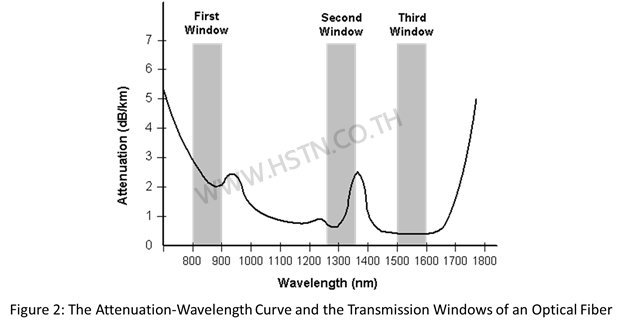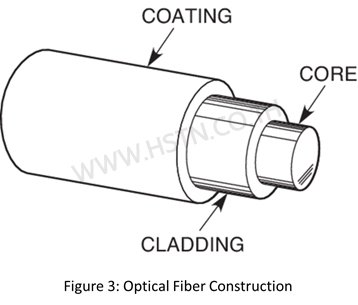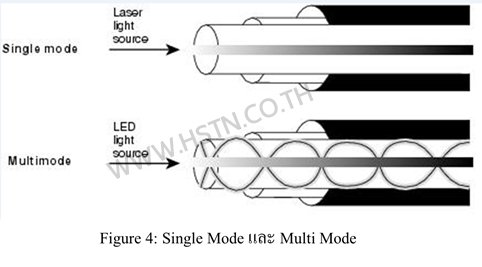Fiber Optic Link Components Ep1

Fiber Optic Link Components (Part 1)
How to use and understand Fiber Optic, The first thing should understand what important of elements Fiber Optic Link with the components are 4 parts the picture 1
1. Optical Transmitter
2. Optical Fiber/Cable
3. Connectors
4. Optical Receiver
1. Optical Transmitter
2. Optical Fiber/Cable
3. Connectors
4. Optical Receiver

Transmitter
The transmitter is responsible for converting electrical signals to a light wave,predominantly diodes surface emitting LED or diodes lasers(Light Amplification by Stimulated Emission of Radiation), although some are vertical cavity surface emitting lasers (VCSEL).
LED : Is used in multimode applications and has the largest spectral width that carries the least amount of bandwidth.
VCSEL : Is also used in multimode applications with a narrower spectral width that can carry more
bandwidth than the LED
LASER : Has the smallest spectral width, carries the most bandwidth, and is used in singlemode applications
The transmitter is responsible for converting electrical signals to a light wave,predominantly diodes surface emitting LED or diodes lasers(Light Amplification by Stimulated Emission of Radiation), although some are vertical cavity surface emitting lasers (VCSEL).
LED : Is used in multimode applications and has the largest spectral width that carries the least amount of bandwidth.
VCSEL : Is also used in multimode applications with a narrower spectral width that can carry more
bandwidth than the LED
LASER : Has the smallest spectral width, carries the most bandwidth, and is used in singlemode applications
These sources produce light at certain wavelengths depending upon the materials from which they are made. Most fiber optic sources use wavelengths in the infrared band, specifically 850nm,1300nm and 1550nm. For
reference, visible light operates in the Attenuation-Wavelength Curve and the Transmission Windows of an Optical Fiber (see Figure 2).
reference, visible light operates in the Attenuation-Wavelength Curve and the Transmission Windows of an Optical Fiber (see Figure 2).

Optical Fiber/Cable
In this section, we discuss the structure and properties of an optical fiber, how it guides light, and how it is cabled for protection.An optical fiber is made of 3 concentric layers (see Figure 3):
1. Core: This central section, made of silica or doped silica, is the light transmitting region of the fiber.
2. Cladding: This is the first layer around the core. It is also made of silica, but not the same composition as the core. This creates an optical waveguide which confines the light in the core by total internal reflection at the
core-cladding interface
3. Coating: The coating is the first non-optical layer around the cladding. The coating typically consists of one or more layers of polymer that protect the silica structure against physical or environmental damage. The coating is stripped off when the fiber is connectorized or fusion spliced.
In this section, we discuss the structure and properties of an optical fiber, how it guides light, and how it is cabled for protection.An optical fiber is made of 3 concentric layers (see Figure 3):
1. Core: This central section, made of silica or doped silica, is the light transmitting region of the fiber.
2. Cladding: This is the first layer around the core. It is also made of silica, but not the same composition as the core. This creates an optical waveguide which confines the light in the core by total internal reflection at the
core-cladding interface
3. Coating: The coating is the first non-optical layer around the cladding. The coating typically consists of one or more layers of polymer that protect the silica structure against physical or environmental damage. The coating is stripped off when the fiber is connectorized or fusion spliced.

In Fiber optic communications, Single Mode and Multimode fiber constructions are used depending on the application. In Multimode fiber (Figure 4), In Single mode fiber, (Figure 4)

By MiMhee
| Survey On Site or Design for Esimate Cost | No charge |
![]() SLA : Bangkok, We're support and service with in 12 hours.
SLA : Bangkok, We're support and service with in 12 hours.
![]() SLA : Upcountry, We're support and service with in 24 hours.
SLA : Upcountry, We're support and service with in 24 hours.
MORE INFORMATION
TEL. 02-889-4701, 02-889-4702 FAX. 02-889-4700
CALL CENTER : 082-726-5320, 082-726-5321, 082-726-5322



